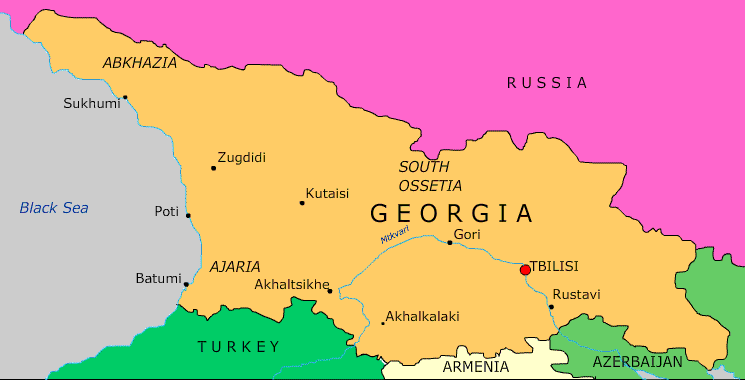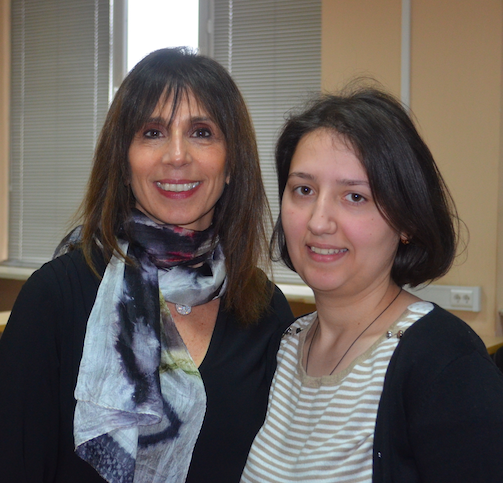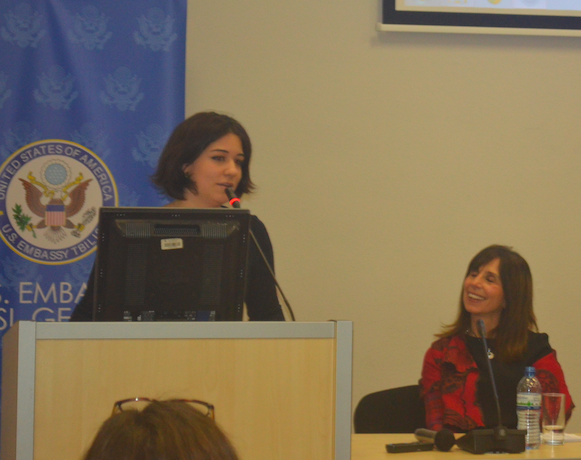4 Myths About Governments, Funders and Men

Georgian Larisa Pataraia spoke on what it will take to close gender inequality gaps.
As I traveled around the Republic of Georgia in Eastern Europe a few weeks ago, I met female university students and businesswomen who gave me hope for the future.
 Larisa Pataraia, who is very knowledgeable about Georgia’s gender rankings, spoke with great poise about what it would take to close gender inequality gaps in government, business and academia. A remarkably eloquent, self-confident freshman, Mariam Perishvili described how there’s nothing wrong with girls and women and how there’s nothing we need to fix. Mariam is top math student, a runner and leader. She’s been successful doing things her own way – not by doing things the way boys do. Nutsa Dzamaahvili exemplified the saying “still waters run deep” as she quietly, yet confidently, shared her future plans to become a Fulbright scholar. It was such a pleasure to get to know Nutsa as she accompanied Molly Rydzynski, from the Cultural Affairs office of the U.S. Embassy in Tblisi, and me throughout the week.
Larisa Pataraia, who is very knowledgeable about Georgia’s gender rankings, spoke with great poise about what it would take to close gender inequality gaps in government, business and academia. A remarkably eloquent, self-confident freshman, Mariam Perishvili described how there’s nothing wrong with girls and women and how there’s nothing we need to fix. Mariam is top math student, a runner and leader. She’s been successful doing things her own way – not by doing things the way boys do. Nutsa Dzamaahvili exemplified the saying “still waters run deep” as she quietly, yet confidently, shared her future plans to become a Fulbright scholar. It was such a pleasure to get to know Nutsa as she accompanied Molly Rydzynski, from the Cultural Affairs office of the U.S. Embassy in Tblisi, and me throughout the week.
But also on this trip, I heard again some deeply entrenched misconceptions – prevalent not just in Georgia – but around the world. Here are four myths I’d like to debunk:
4 COMMON MYTHS
1. “The government will help my business, it’s their job.” Businesswomen repeatedly asked me how the government (theirs, American or any other) was going to help them. I explained that while certainly government has an important role to play in enabling business formation and growth, the best opportunities for growth usually come from the ideas and resources of the private sector. Businesses people need to help themselves, not wait on anyone else.
2. “If you’re equal to men in the workplace, you can’t also be feminine.” A corporate woman pushed back against one of her peers who was advocating for gender equality, saying that she did not want to lose her femininity and have men stop opening doors for her in the name of equality in the workplace. A discussion ensued about how women can be equal at work and at home, and still be feminine; that men could treat women equally and yet still be chivalrous, and that there were times when women need to open doors for men too. It’s not either/or, it is BOTH/AND.
3. “Men won’t help women because they’re competing for the same jobs.” When talking at a university in Georgia about how gender equality is best achieved when women and men work together, a female university student told me she did not think men would help women because women are competing with men for jobs. I disagreed, and explained that a winning economic formula is when educated men and women like her, create new jobs and expand the economic pie – not fight for the crumbs on the table.
“Create new jobs and expand the economic pie – don’t fight for the crumbs on the table.”
4. “Funders have too many requirements for funding.” A businesswoman complained that potential investors would only invest in her business if she also personally invested. I explained that funders and lenders all over the world only provide capital when entrepreneurs are also invested and share the risk with them.
DON’T GET STUCK
One of the biggest problem with these persistent myths is that if you believe them, you are stuck. You are held back because you’re either frustrated at funders, waiting for the government, or not working jointly with men. To move forward and make progress we must be self-reliant and work collaboratively with government, funders and men. But, we cannot wait on them to make the first move. Leadership is ours for the taking, we just need to own it.

Nutsa Dzamaahvili, one of the remarkable young women I met who is an intern at the U.S. Embassy in Tbilisi with me at one of our many events.
HOPE AND THE FUTURE
While these four misconceptions remind me how much further we have to go to achieve gender equality around the world, I am not discouraged. I only have to think about Tinatin Rukhadze, a Georgian entrepreneur who is expanding her business regionally, or Tamar Qachashvili, who runs a successful business in animal science, a field that has been almost exclusively the prevue of men, or of the positive changes that Larisa, Mariam and Nutsa will lead.

Georgian Mariam Perishvili spoke on how girls and women don’t need to be fixed!
These Georgian women embody the courage and resilience I have seen in the undeterred women around the world. Undeterred women in developing and emerging economies are the ones who are self-reliant and are not waiting on anyone else. These women are busy moving forward no matter what, creating jobs, change, and the future.
It was an honor to be invited by the U.S. State Department through the Embassy in the capital, Tbilisi, Georgia. I spoke at five universities and to six different groups of businesswomen around the country in March 2015. The trip was to celebrate Women’s History Month and to encourage the participation of women in the economy.